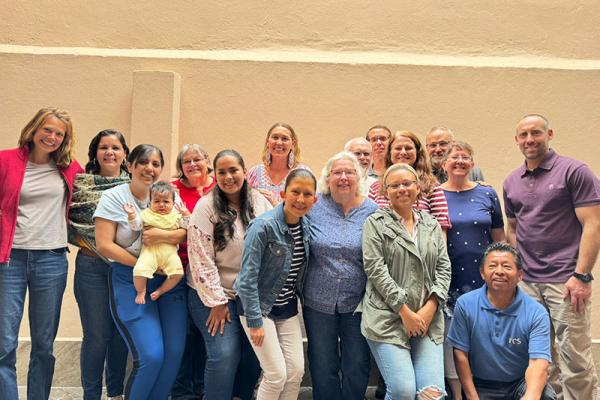What's Biblical Integration?

Twenty years ago, I was asked to teach a course on Biblical Integration in Bratislava, Slovakia, for a week and I had no idea what I would say. However, preparing that class was a turning point in a journey that continues today.My journey
I grew up in a good Christian home. My parents were sacrificially committed to telling people about their need for a Savior. Family devotions with Bible reading were a regular part of life, as well as active involvement in a great local church. After high school, I attended Bible college, but struggled because my chosen profession—scientist—seemed to have no place in “Christian ministry.” It took an almost audible word from God to move me toward a career that combined my interests and gifting with “God’s work”—missionary teacher. At that time, I had only a glimmering of what was involved besides going overseas to teach science. After three years of Bible and theology, I graduated with all the academic qualifications to be a full-time pastor or missionary, but it was only after all of this that I began to realize that the Bible had something to say about all of life—things like traffic laws, finances, and the sciences. Eventually I ended up teaching at Black Forest Academy, but it was 20 years—in Bratislava—before I finally began to see how what I taught could be related to God’s word in a way that made sense to me and in a way that I could communicate to others.
What is wrong with this picture? It is clear from my experience that the presence of the Bible, knowledge of the Bible, or even study of the Bible, doesn’t guarantee that anyone can begin intentionally making connections between all of life and learning and God and His word. The most critical thing I learned that week in 1998 was to stop trying to find Bible verses to fit into my chemistry classes and begin thinking carefully about how chemistry—and everything else—fit into who God is and what He is doing. It required a 180o shift in thinking. However, I’ve discovered at least two symptoms of a debilitating problem in my autopilot, my view of the world when I’m not consciously thinking about it, that undermine the role of the Bible in my teaching.
Limited understanding of redemptionThe first symptom of my problem that I began to recognize was a limited understanding of redemption—“It’s all about me.” I had heard lots about redemption in Christ, but somehow my concept of redemption was too small. It wasn’t as big as the scope of God’s creation or man’s sin.
Probably the most well-known salvation verse in the Bible is John 3:16. It is quoted in all kinds of appropriate—and sometimes inappropriate places. “For God so loved the world.” But, I hadn’t thought about all that it means. For instance, what in the world does “world” mean? In 1 John 2:15, the same author says, “Love not the world, neither the things that are in the world.” How can both verses be true?  Why would John tell us not to love what God loves? It seems we must be careful about our definitions, because there are at least two very different “worlds” being talked about. One talks about the sin-shaped system that tries to function independent of God, denying His involvement and thanklessly misappropriating His gifts, and the other talks about people—right?
Why would John tell us not to love what God loves? It seems we must be careful about our definitions, because there are at least two very different “worlds” being talked about. One talks about the sin-shaped system that tries to function independent of God, denying His involvement and thanklessly misappropriating His gifts, and the other talks about people—right?
Why didn’t God clear up the confusion when He revealed His heart to John and inspired him to write both passages? Why didn’t John just say, “For God so loved people?” Did God want to include more about Himself in this revelation? What about “For God so loved the earth and everything in it, including people?” After all, He made the whole universe with great creativity, an eye for beauty, even a sense of humor, and then He put people in His world to care for and develop everything. Does God still love everything He made even though people’s sin has caused so much pain, destruction and death? Do we believe that redemption involves EVERYTHING?
What if John had written, “For God so loved the cows?” Does that sound sacrilegious? Consider what God said to the most famous and successful evangelist of the Old Testament? Jonah may have been reluctant, but that is understandable if we remember that his mission was liking sending a Messianic Jew to Tehran today for an open-air evangelistic crusade. However, in 3 days, hundreds of thousands of people repented, and the course of history was transformed. You remember Jonah wasn’t pleased with the results. He didn’t believe that Gentile “dogs” should be saved. They didn’t even qualify as people in his mind. So, God had to set him down and reveal His heart to the reluctant evangelist. “Should I not pity Ninevah, that great city, which has more than 120,000 persons who do not know their right hand from their left”—children under the age of 3 or 4—"and also much cattle.” God loves His cows on whichever of the 1000 hills they now live as Asaph (50:10) and David confirm in the Psalms (36:6).
There isn’t anything in all God’s creation that He isn’t concerned about, that isn’t cared for by Him, even if people are worth more than anything else. Jesus confirmed that people are worth more than many sparrows (Luke 12:7), but that doesn’t give anyone the right to misuse or devalue the smallest part of His creation. As Abraham Kuyper said, “There is not a square inch in the whole domain of our human existence over which Christ, who is Sovereign over all, does not cry, Mine!”
But is this just an Old Testament idea? Romans 8 is well known and verse 28 is often quoted (“we know that all things work together for good to them that love God, to them who are the called according to his purpose”), but verses 19-23 don’t seem to be as popular.
19 For the creation waits with eager longing for the revealing of the sons of God. 20 For the creation was subjected to futility, not willingly, but because of him who subjected it, in hope 21 that the creation itself will be set free from its bondage to corruption and obtain the freedom of the glory of the children of God. 22 For we know that the whole creation has been groaning together in the pains of childbirth until now. 23 And not only the creation, but we ourselves, who have the firstfruits of the Spirit, groan inwardly as we wait eagerly for adoption as sons, the redemption of our bodies.
All of creation is waiting for its liberation from all the effects of sin. Christ not only has redeemed people but will also remove all the effects of sin from His creation. People are first, but not to the exclusion of everything else. Our understanding of redemption must be as big as God’s. In Colossians 1:20-21, Paul reminds us that through Christ “God reconciled everything to himself. He made peace with everything in heaven and on earth by means of Christ’s blood on the cross. This includes [people] who were once far away from God,” but it is obviously not restricted to people. Somehow, we have interpreted the Bible so that the good news it contains is only about people, as if every other part of God’s originally good creation is completely disposable and only people are “recyclable,” redeemable.Limited understanding of "calling"
But the “It’s all about me” attitude wasn’t the only evidence of a misapplied Bible. The second symptom of the problem was a limited understanding of God’s calling—“It’s just a job.”
Probably everyone has heard some lightbulb jokes like, “How many folk musicians does it take to change a lightbulb? Five. One to change the lightbulb and four to write songs about how much better the old bulb was.” Or one senior—but it takes forever. Or



